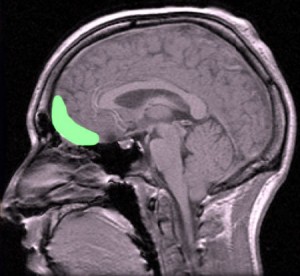Fridays post from BPS Research Digest looks at role of imagination in Obsessive Compulsive Disorder.
Considering that obsessive compulsive disorder (OCD) is characterised by a fear that “bad things” will happen if certain rituals are not performed, it’s surprising that so little is known about the role of imagination in the condition.
All the more so given classic work by Daniel Kahneman and Amos Tversky that showed the easier we find it to imagine a given outcome, the more probable we think that outcome will be – a phenomenon they dubbed the simulation heuristic. Read more
Source: BPS Research Digest

 Idle mind. Patients with obsessive-compulsive disorder and their relatives show reduced activity in the orbitofrontal cortex region (green) of the brain.
Image Credit:
Paul Wicks,
Kings College Â
Â
Link to Read More:Â ScienceNOW
By Steve Mitchell
ScienceNOW Daily News
17 July 2008
Cambridge researchers have discovered that measuring activity in a region of the brain could help to identify people at risk of developing obsessive compulsive disorder (OCD). As the current diagnosis of OCD is based on a clinical interview and often does not occur until the disorder has progressed, this could enable earlier more objective detection, and intervention. [continue reading…]
Published: March 17, 2008
Most people occasionally worry about germs, strange noises in the night, or whether they forgot to turn off the oven before leaving on vacation. But for as many as 5 million Americans with obsessive-compulsive disorder (OCD), such anxieties are constant – and can almost literally take over their lives.
Now two expert clinical psychologists at the University of North Carolina at Chapel Hill will, for the first time, use cognitive-behavioral therapy (CBT) to treat couples in which one partner has OCD. The therapy has been effective in treating individuals who have OCD, and in treating couples where one partner suffers from another health problem. This is the first time the therapy will be used in couples involving a partner with OCD. [continue reading…]
Published: January 18, 2008
In a study that may significantly advance the understanding of how cognitive-behavioral therapy affects the brain, researchers have shown that significant changes in activity in certain regions of the brain can be produced with as little as four weeks of daily therapy in patients with obsessive-
compulsive disorder (OCD). The discovery could have important clinical implications, according to principal investigator Sanjaya Saxena, M.D., Director of the Obsessive-Compulsive Disorders Program at the University of California, San Diego (UCSD) School of Medicine, whose findings are published on line this week in the journal Molecular Psychiatry.
“The study is exciting because it tells us more about how cognitive-behavioral therapy works for OCD and shows that both robust clinical improvements and changes in brain activity occur after only four weeks of intensive treatment,” said Saxena. [continue reading…]

